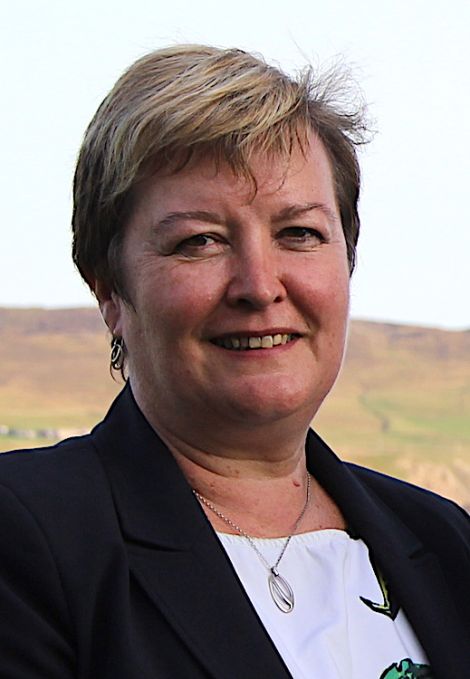Community / Opposition mounts to Universal Credit cut – but Tories carry on regardless
Food bank predicts loss of £20-a-week will increase demand for parcels
THE OPERATORS of Shetland’s food bank fear that the UK Government’s £20-a-week cut in Universal Credit will result in a “significant” increase in the number of islanders needing support.
Agencies and politicians from across the spectrum have united in opposition to the removal of an uplift to Universal Credit that was worth over £1,000 a year to families, which comes into effect today (Wednesday).
The Tory government has faced months of calls from agencies including Citizens Advice Bureau, the Trussell Trust, the Joseph Rowntree Foundation, Save the Children, parliamentarians from the Greens, Labour, Liberal Democrats, SNP and even within its own ranks to abandon a move that could plunge over 800,000 people into deeper poverty.
Hundreds of low income islanders will be affected and the decision to make the cut amid rocketing energy prices and the end of the Covid-19 furlough scheme at the start of the winter has been branded “morally reprehensible”, “unfair” and “out of touch” by isles politicians.
David Grieve of the Shetland Foodbank said they were “bracing” for a “significant rise in the number of clients”, though he said it was hard to gauge how big the increase would be.
“Not only are those struggling on low income from Universal Credit going to face a £20 per week cut in income, they are also going to be hit by a big increase in electricity costs, especially those forced to use prepayment meters,” he said. “It is a total no-win situation.”
He said a single adult over the age of 25 would now revert to a payment of just over £100 a week and “that has to pay for heating, rent and food as well as any other essential costs such as a phone”.
Become a member of Shetland News
“That compares with a basic state retirement pension of just below £180,” Grieve said. “How is that fair and equal?”
Between 1 July and 30 September this year 174 parcels were distributed to feed 192 adults and 32 children in Shetland.
That number is down on the equivalent time period in 2020, but the figures are not comparable because the Anchor team within Shetland Islands Council’s social work department began supplying food parcels to around 60 families every month from the end of last summer – transferring some of the burden away from the food bank but not indicative of any reduction in poverty.
Karen Eunson of the Shetland branch of Citizens’ Advice Scotland said the organisation continues to call for the government to “cancel the planned Universal Credit cut and is highlighting the negative impact the cut will have on claimants”.
“The uplift was temporary for the pandemic but Universal Credit has not kept pace with inflation,” she said. “There were lower than inflation increases between 2013-15 and a benefits freeze from 2016-19. This means that if the £20 cut is made, Universal Credit will be worth 8.5 per cent less in real terms than it was in 2013.”
Eunson said it was important to recognise Universal Credit did not just benefit the unemployed – around half of claimants in Shetland are people who have a job but qualify for assistance due to low income.
“The cut… is being made at the same time that furlough is ending, debt mitigations are stopping and against a background of rising costs for food and energy,” she said. “Many people are worried about how they are going to manage over this winter.”
Northern Isles MP Alistair Carmichael said a combination of rising inflation, increased energy costs, the end of furlough and other Covid-related support “should make any sensible government pause at the very least”.
“Instead Boris Johnson and his colleagues insist on carrying on regardless,” Carmichael said. “The people who will be hit hardest are those who they claim they want to help – families where people work hard but are on low wages.
“Whether it is ignorance or indifference it shows that this is a government that is hopelessly out of touch.
“It should be remembered that money spent on Universal Credit almost certainly goes back into the local economy as it is spent on basic needs. Money spent on giving tax breaks to Tory donors and cronies will be squirrelled away in tax havens.”
Scottish Labour’s Highlands and Islands MSP Rhoda Grant is calling for the Scottish Government to introduce a £70 winter fuel supplement for low-income pensioners and struggling families to tackle a “cost of living crisis”.
She said such a scheme would help an estimated 1,657 people in Shetland – consisting of 1,140 households currently receiving a council tax reduction, 372 pension credit recipients and 145 children receiving winter heating assistance.
“The Scottish Government can make a difference here,” Grant said. “We have the powers to ensure payments reflect the pressures on fuel poor households – but the SNP have delayed taking responsibility.
“The winter months are fast approaching and we have a cost of living crisis escalating by the day – there is no time to waste. The SNP must back this policy now and start moving to get this money in people’s pockets.”
But the SNP’s Highlands and Islands list MSP Emma Roddick was clear that the UK Government, which controls the welfare system, needs to take responsibility and said axing the uplift to Universal Credit was “as ridiculous as it is morally reprehensible”.
In a speech in the Scottish Parliament last week she said it was “the biggest overnight cut to social security in my and most people here’s lifetimes”.
Roddick referred to Trussell Trust research suggesting one in five Universal Credit claimants would struggle to get to work or pay their winter heating bill, while over 115,000 people will likely have to skip meals.
“Boris Johnson’s government cannot be described as compassionate in the best of times but to cut Universal Credit at a time when household bills are continuing to rise due to rising fuel prices is particularly cruel,” she said.
Roddick said it contrasted with the introduction of a Scottish child payment and now a new Scottish child disability payment: “This is truly a tale of two governments and illustrates well why Scotland requires the powers of independence to truly transform our society into the kinder and more caring one we all desire.”
When challenged on the subject at the Tory party conference in Manchester this week, Johnson repeatedly emphasised the importance of raising the level of wages, and bemoaned the fact that pay has remained stagnant over the past decade.
The Conservatives have been in power in the UK since 2010 and have governed alone since 2015.
Johnson told STV this week: “What we’re saying is that the way forward for this country is not to raise taxes and subsidise low pay, and not to keep going with the whole massive £407bn Covid package.”
- Anyone who is facing money worries can contact Shetland’s Citizens Advice Bureau by phoning (01595) 694696 or emailing via its website for free and confidential advice.
Become a member of Shetland News
Shetland News is asking its readers to consider paying for membership to get additional perks:
- Removal of third-party ads;
- Bookmark posts to read later;
- Exclusive curated weekly newsletter;
- Hide membership messages;
- Comments open for discussion.
If you appreciate what we do and feel strongly about impartial local journalism, then please become a member of Shetland News by either making a single payment, or setting up a monthly, quarterly or yearly subscription.































































